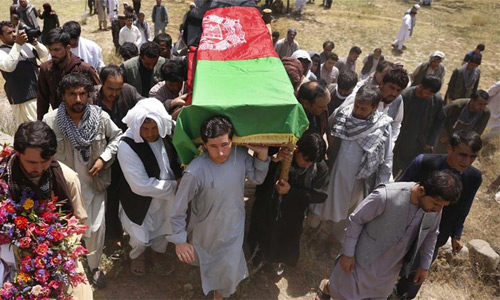Militancy and terrorist attacks in populated areas and major cities were described as the main causes of civilian casualties in 2015, underscoring a push by Taliban militants into urban centers “with a high likelihood of causing civilian harm”. Including Taliban-claimed attacks, the United Nations Assistance Mission in Afghanistan assigned responsibility for 62 per cent of total civilian casualties in 2015 to anti-government elements. However, the report also noted a surge in casualties caused by pro-government forces, including the international troops.
While ground engagements were the largest cause of civilian casualties, improvised explosive devices came second, the UN said in its 2015 report, adding that the use of such weaponry was in violation of international law and could constitute war crimes.
Worst of all, the SIGAR reported that civilian casualties in 2016 were the highest since the United Nations Assistance Mission in Afghanistan began recording them in 2009. That count found conflict-related civilian casualties in Afghanistan rose to 11,418. The record high civilian casualties continued up to the current years and the militant fighters, mainly the Taliban and the ISIS group carried out the bulk of the casualties.
With a new wave of privately run seminaries/madrasahs being opened across the country, the women’s rights groups feared that women’s freedoms were again under threat. Three years ago, it was reported that 1,300 unregistered madrasahs were operating in Afghanistan, where children were given only religious teaching. This was increasing fear among those involved in mainstream education. Arguably the most controversial of these madrasahs was Ashraf-ul Madares in Kunduz, founded by two local senior clerics, where 6,000 girls were said to study full time.
Generally speaking, heavy casualties inflicted upon Afghan civilians and soldiers will fill one with a strong sense of disappointment. The post-Taliban democratic government could not stop the bleeding. The heart-wrenching stories repeat one after another. Although the Taliban vowed, in Doha talks with Afghan political figures, not to target civilians, the recent roadside bomb blast in Kandahar killed and wounded tens of Afghan civilians, which were widely believed to be carried out by the Taliban. It suggested that the Taliban will not be trusted.
The gory incidents and hemorrhage suggest that the Taliban are not genuine in the peace talks. The spate of terrorist attacks in recent months has added to public disappointment and the public fear a deadlock in the talks.
The emergence of democracy in the post-Taliban Afghanistan has sustained strong blows mainly from the insurgent groups. Counting fatalities and hearing or reading heart-wrenching stories every day in a democratic country seem ridiculous. The nonstop sufferings and heavy casualties in Afghanistan put democracy under serious question. I believe that a democratic country does not necessarily mean having only a democratic constitution when political rehearsal goes against it. The country’s constitution hold people’s rights, liberty and dignity in respect – this is in ideal world but violated realistically. In addition to having a constitution based on democratic values, presidential and provincial elections, and parliament, protecting people’s fundamental rights i.e. rights to life, liberty and estate and natural dignity is far significant for a democratic society.
It is hoped the government will take high steps in safeguarding the rights and dignity of Afghans and reinforce the soldiers to retaliate the past casualties. It is further prayed that Afghan nation will no further be a casualty of radical mindsets and fundamental ideology of militant groups.
Martin Luther, a Nobel Laureate, once said, “Violence as a way of achieving racial justice is both impractical and immoral. I am not unmindful of the fact that violence often brings about momentary results. Nations have frequently won their independence in battle. But in spite of temporary victories, violence never brings permanent peace. It solves no social problem: it merely creates new and more complicated ones. Violence is impractical because it is a descending spiral ending in destruction for all. It is immoral because it seeks to humiliate the opponent rather than win his understanding: it seeks to annihilate rather than convert.”
To sum up, the reason behind all this violence are believed to be: practicing no religious tolerance; exercising fundamental ideology; claiming racial superiority; humiliating human rights and dignity and treating one another with disdain. If human societies do not uphold the fundamental rights of mankind, violence and bloodshed will continue unabated.
Since conflict has only led to casualties and destruction, the warring sides have to resolve their issues through meaningful talks so that all citizens, mainly civilians, could live a peaceful life.
Home » Opinion » Civilian Casualties – Great Cause for Concern
Civilian Casualties – Great Cause for Concern
| Hujjatullah Zia

